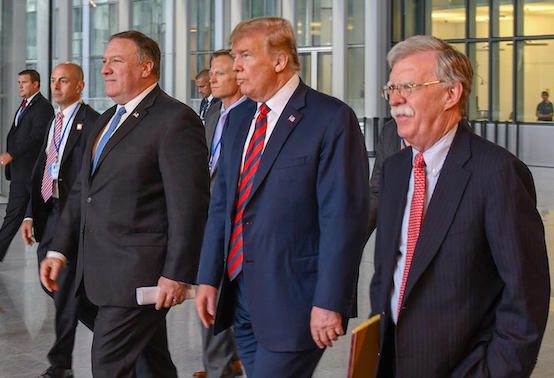The Destructive Iran Obsession

Pompeo’s anti-Iran talking points remain as stale and misleading as ever:
He said Iran aimed to dominate “five capitals,” a reference to the government seats of Iraq, Lebanon, Syria, Yemen and Iran itself.
“And our effort is to make sure that the Iranian people get control of their capital, and that it becomes a nation that is normal and isn’t conducting terror campaigns that are unrivaled anyplace else in the world,” he said.
Pompeo’s remarks are probably the clearest public indication yet that the Trump administration’s policy is one of regime change. While this is presented as putting the people in “control of their capital,” it really means pursuing the overthrow of the current government in an attempt to force Iran to make a radical change to its foreign policy. It is very doubtful that most Iranians would want to help the U.S. achieve either of these goals, especially when the U.S. is strangling their economy and inflicting collective punishment on them through sanctions.
The Iranian government has varying degrees of influence in the other four countries Pompeo mentioned, but in none of them does it “dominate” the capitals. Pompeo overstates Iran’s ambitions and its capabilities, and he misrepresents its support for proxies in other countries as something that “normal” states don’t do. The belief that Iran’s foreign policy would significantly change as a result of regime change seems to be based on little more than wishful thinking and an overly ideological interpretation of the Iranian government’s behavior. Pompeo’s claim that Iran engages in “terror campaigns that are unrivaled anyplace else in the world” is untrue, and making such a claim requires ignoring behavior of U.S. clients and other states that is every bit as destabilizing and destructive if not more so.
The Trump administration is running into difficulty mobilizing other states to oppose Iran because unremitting hostility to one of the largest regional states is not in the interest of most of them. Oman and Kuwait benefit from having relatively cordial relations with Tehran, and Qatar has drawn closer to Iran over the last year and a half as a direct result of the Saudi-led blockade. Iraq has strong economic incentives to maintain good relations with Iran. Egypt and Turkey don’t view Iran as a major threat. The Iran obsession that defines the administration’s approach to the region is shared by only a handful of regional governments, and in practice that means that the “anti-Iran coalition” that Pompeo keeps talking up is limited to the Saudis, Bahrain, and the UAE.
The administration’s obsession is so irrational and excessive that it discredits them:
Mowaffak al-Rubaie, a former Iraqi national security adviser, said that Mr. Pompeo had “tunnel vision” when it came to the Middle East.
“There are a lot of other problems than Iran, but they are obsessed with Iran,” he said. “If two fish fight in the Tigris River, it is because of Iran.”
Because they see everything that happens in the region in terms of Iran’s “malign activities,” the administration inevitably has a seriously distorted view of every conflict and problem in the region. That in turn blinds them to the destabilizing activities of U.S. clients and leads them to indulge those clients in their worst behavior. All of that raises tensions and makes war with Iran more likely, and it exacerbates ongoing conflicts and undermines efforts to bring them to an end.
Comments